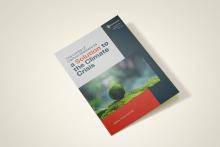Africa's economic future hinges on its ability to navigate climate-related risks while mobilizing finance to build resilient economies. This lecture will explore the interlink of climate risks, financial regulation, and sustainable finance, drawing on insights from my advisory work with central banks, financial institutions, and UN agencies, and from my teaching roles at University of Cape Town and Strathmore Business School. The lecture will examine how climate risks affect macroeconomic shocks and explore Africa's evolving climate-related regulatory landscape, including prudential frameworks and disclosure requirements. We will explore recent developments, including new reporting standards, innovative finance products, carbon market regulations, and green finance taxonomies. Through practical examples from my engagements with industry alliances such as the Kenya Bankers Association, Alliance for Financial Inclusion (AFI), and Glasgow Financial Alliance for Net Zero (GFANZ), the lecture will demonstrate how climate risk challenges and financial opportunities will shape Africa's development trajectory. At the end of the lecture, participants will gain a clearer understanding of the critical links between climate risk management, financial innovations, regulatory developments, and the continent's development goals.

